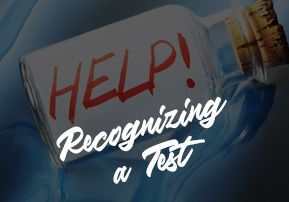
Recognizing a Test
When we recognize a test, it does not mean we always pass it, but recognizing an event as a test from Above is the first step to being able to pass it…

Our lives, especially true of Ba’alei Teshuva – the newly observant – often involve tests and signs. When we become spiritually aware, we see things from a different perspective and sense G-d’s communication with us. When we recognize a test, it does not mean we always pass it, but recognizing an event as a test from Above is the first step to being able to pass it. How do we recognize an event as a test? A simple way to do this is becoming aware of events that spark uncomfortable emotions and our response to them. Such an occurrence may not upset our neighbor, our spouse, or anyone else, but if it upsets us in any way, we can be fairly certain it is a personal test for us.
G-d is hoping that we are able to practice Ein Od Milvado (There is non other than Hashem) during this disturbing time whether it is over something small or something not so small. The way we practice Ein Od Milvado is to see Hashem as the One Who orchestrated the event and to recognize the disturbance as a test. Then our job is to literally force ourselves to respond with deliberation and thought. If we react in a  habitual way with negative words or actions, we probably did not see Hashem or recognize the situation as a test from Him.
habitual way with negative words or actions, we probably did not see Hashem or recognize the situation as a test from Him.
When events push our buttons like a disrespectful child, a husband who does not do what we expected him to do, an interruption in our day, an angry boss, the weather that did not cooperate with our planned barbecue, or anything else that is not to our liking, these are all tests of our response. If we react negatively and succumb to our negative emotions, we have work to do.
We work on being able to accept our negative emotions and breathe until they dissipate. By recognizing our emotional trigger, by allowing it to diffuse and not rush a reaction, and by perceiving that it’s all from Hashem and for the best, we save ourselves untold heartache and disappointment. We may not be able to stop the emotion in its tracks, but we do not have to act upon it if we take the time to diffuse it by recognizing the situation as given to us by G-d. Then, however, long it takes, we are best served by controlling our response until we reach a state of calm.
Any time we feel perturbed, frustrated, angry, annoyed, sad, upset, disappointed, discouraged, stingy, selfish, jealous, ungrateful, combative, argumentative, competitive, or fearful—-all negative emotions—we turn to the three principles of emuna. We remind ourselves that everything is from Hashem, that the situation is a test to help us grow to be our very best and that the test has the purpose of leading us to greatness by overcoming our negative character traits. All of the above negative emotions, according to Rav Arush, can be packaged together under the category of arrogance, in that they all represent, in some way, a complaint about how Hashem is treating us in the moment or running the world. Our job is to shift our perspective to one of gratitude and humility in order to avoid sinful, inappropriate behavior.
The first tool is to become aware of our feelings. If our emotions are, in any way, negative, this is a signal that a test has begun, and we begin the process of decompressing as described. The second tool is to repeat Ein Od Milvado and recognize the situation that provoked our negative emotion as a test from Hashem. The third tool is to wait until a sense of calm emerges and then to respond in a way that is above our nature. Then after the event has passed, when we are doing our soul accounting at night, we can commune with Hashem to determine what character trait He wants us to work on. For example, if we get upset with our child for being too slow in cleaning his room, we realize we must work on patience, especially if tests of patience are frequently given to us.
As long as we try our best and speak to Hashem about the events that have been difficult for us, we need never beat ourselves up for failing a test. We simply pick ourselves up and try again. Progress comes from awareness and a conscious way of approaching life. Life is a purposeful “game” where we can choose to play by the rules and learn good character traits. It is important to mend relationships during this time. When we see the purpose of our lives as spiritual growth and accept the challenge, we have already chosen greatness. May we all do our very best to become better versions of who we truly are and merit to see positive changes in the world thanks to our own personal effort.












Tell us what you think!
Thank you for your comment!
It will be published after approval by the Editor.